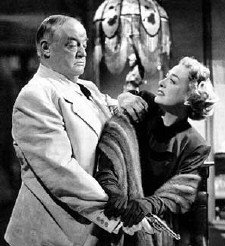Flaming Shadows: on Flamingo Road
In perusing an article by Rudolf Arnheim titled "The Film Critic of Tomorrow," I found great contempt placed on that film reviewer who "discusses films no one has been able to see in ten years or more (and about which they can say everything and nothing) with people of his own ilk." While I completely understand this gripe (and on frequent occasions would have to agree with it), part of me does not care, cherishing (or perhaps merely assuming) that you, dear reader are of my "ilk," and therefore, care. So I will trudge on with an OLD film which took me to one place or another as I curled up on the couch just the other day. (Furthermore, Mr. Arnheim's thesis is slightly mute when considering the invention of home viewing technologies - the essay was written in the thirties, or at least this is my presumption) What does it mean (if anything) that I look back? Let this question be a nagging thread at the back of your head as you continue forward.
 Well into her career as a social and erudite maven, Joan Crawford, post-Pierce reteamed with that crew whose support delivered her sole Oscar. This time, but four films after the gold, Crawford, having successfully weaned herself of her impertinent mannerisms (having started as an amateur dancer, descended from a Vaudevillian bloodline and receiving her first big break from the type of film that, if mentioned here, could possibly attract legal repercussions from her estate) Crawford's rags to riches is quite believable.
Well into her career as a social and erudite maven, Joan Crawford, post-Pierce reteamed with that crew whose support delivered her sole Oscar. This time, but four films after the gold, Crawford, having successfully weaned herself of her impertinent mannerisms (having started as an amateur dancer, descended from a Vaudevillian bloodline and receiving her first big break from the type of film that, if mentioned here, could possibly attract legal repercussions from her estate) Crawford's rags to riches is quite believable.
Flamingo Road is the film, and it is one that harks back to a slightly more nuanced time. ('Is it possible to feel nostalgia for a time you never experienced?' a friend inquired last night. Indeed.) Like a certain more socially respectable version of The Naked Kiss, Road recounts the story of a carnival dancer named Lane Bellamy who deserts the carnival to begin life anew in a quaint little southern town. Of course, there is a dark underbelly to this quaint little town (as it would seem all Southern towns are neither really quaint nor benign). As she falls for a potential senatorial candidate named Fielding, the plump sheriff who rules the town with a corrupt iron grip has Lane sent up the river on prostitution allegations. Having served her dues (of course she was framed) she returns to the town to work at the local (oh-so respectable) roadhouse run by a maven of a different sort entirely. Lutie Mae is a character one happens upon repeatedly in such films. Candy from The Naked Kiss in certainly a Lutie-Mae incarnation(which, to give Road credit, was made 15 years later from this rather prevalent formula). Lane finds her paramour who yields considerable power, dons some furs and bedazzled, reaches for the reigns. The tides have already turned, however, and that this would happen, we knew all along.
There's something to be said for the film's use of shadow. Seldom have I seen a film of this sort (it's not quite a noir, nor is it a Women's film) use shadow so aptly. Instead of the air of aristocracy which slowly informs Crawford's face (though, for the actress, it would seem perpetually, neurotically plastered there) as she ascends in the social hierarchy of the town. That mug which is most frequently graced with infallible lighting is shrouded in shadow, foreboding. Seldom does a scene occur in sunlight. More common is the night shot in which no party is readable, instead cloaked in the night which envelopes them like the horrible fruition which we all know will come to pass. Two cameos in the dark.
The malevolent Titus, corrupt sheriff and vile personality is the other uncompromising strength of the film. Rarely are the baddies so egotistical and deliciously wicked. When he goes about doing wrong, it is at once both personal affront and guiltily satisfying. He is black to the core and all the better for it. When Crawford slaps him in the films first few reels, we give a completely gratifying gasp. As he wolfs down pie after pie at the local diner, the bus boy retrieving milk, pitcher after pitcher, we understand the dirty gluttony of this twisted officer (who rather resembles Welles' corrupt policeman in Touch of Evil). You want him to pay, and you know he will. When Crawford finally shows up and unwraps a pistol from her furs, we are at once justified and sad to see him go.

0 Comments:
Post a Comment
<< Home